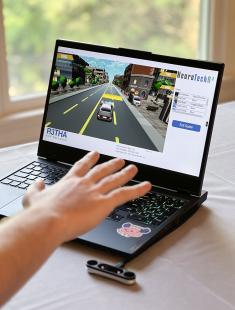Rutgers Startup NeuroTechR3 Announces Research Collaboration with Kessler Foundation

Collaboration hopes to advance neurorehabilitation technologies for persons recovering from stroke (portions of this story courtesy of NeuroTechR3)
Rutgers startup NeuroTechR3, a company focusing on neurorehabilitation technologies, hopes to take its patented research to new heights thanks to a research collaboration with the Kessler Foundation, an organization that supports rehabilitation research and education.
The collaboration aims to enhance the development and deployment of NeuroTechR3's proprietary rehabilitation system, R3THA™ (Rehabilitation Technologies for Hand & Arm), leveraging Kessler Foundation’s expertise and resources to bring solutions to individuals recovering from upper extremity impairments due to stroke and other neurological impairments.
"We are thrilled to collaborate with Kessler Foundation, an esteemed leader in rehabilitation research," said Mee Eriksson, CEO of NeuroTechR3. "Their expertise will be invaluable as we work to bring our technology to more patients, improving their rehabilitation outcomes and quality of life.”
“The Office for Research is proud to support alliances between Rutgers researchers and organizations such as Kessler Foundation,” said Michael E. Zwick, PhD, senior vice president for research. “We share the same goals of creating innovative solutions to complex problems. These types of associations have the potential to increase the reach and impact of patented technologies, such as that of NeuroTechR3.”
The technology that led to NeuroTechR3 was developed by a team of researchers from Rutgers, The State University of New Jersey, and New Jersey Institute of Technology (NJIT), headed by the company’s current Chief Science Officer and assistant professor in the Rutgers School of Health Professions, Qinyin Qiu, PhD. Qiu then partnered with current NeuroTechR3 Chief Executive Officer Mee Eriksson to launch the company along with Amanda Gross, the Chief Technology Officer, who was part of the technology development team and Ashley Mont, PhD, the Chief Research Officer, who was a graduate student during the development phase and is now an assistant teaching professor in the Rutgers School of Engineering.

R3THA is a neurorehabilitation system designed to improve hand and arm function through engaging, machine learning-enabled exergames, which are technology-based games (such as video games) that require participants to be physically active to play. R3THA combines real-time biofeedback with motion-tracking analytics to enhance neuroplasticity and support effective recovery. Its features include a kinematic assessment protocol, adaptive algorithms for personalized therapy, and a HIPAA-compliant therapist portal for integration into clinical workflows.
The system is intended for use across the entire continuum of care, including hospitals, outpatient facilities, home care, telerehabilitation, and home exercises, offering affordable, engaging, and effective hand-exercise solutions.
According to Eriksson, working with the Kessler Foundation will accelerate the clinical validation and broader adoption of R3THA. By conducting a research study at Kessler Foundation, NeuroTechR3 aims to refine its technology and demonstrate its feasibility in diverse settings to improve rehabilitation of individuals recovering from stroke. This collaboration also opens doors to further research opportunities, ensuring that R3THA remains at the forefront of rehabilitation innovation.
"Collaborating with NeuroTechR3 aligns with our mission to advance rehabilitation research and improve care for individuals working to regain upper limb function after experiencing a stroke or other neurological challenges," explained John DeLuca, Senior Vice President of Research and Training at Kessler Foundation. "We are excited to explore the potential of R3THA and its impact on neurorehabilitation."



